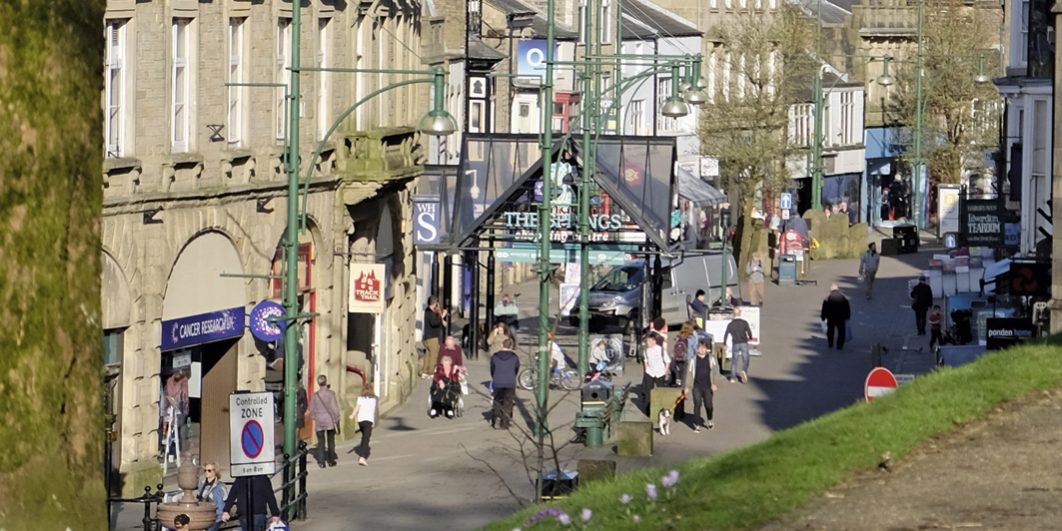Buxton has been shortlisted for the next stage of the Future High Streets Fund (FHSF) following an expression of interest submitted by High Peak Borough Council in March 2019.
The town is one of 50 across the country chosen from more than 300 applications. Each is awarded up to £150,000 to work up proposals in order to apply for up to a maximum of £25m capital investment funding (although £5-10m per town centre is expected).
Buxton joins Heanor, Mansfield, Coalville, Nottingham City Centre and St Peters Cross, Derby as shortlisted towns from the East Midlands region. A full list of shortlisted towns can be viewed here.
The FHSF initiative aims to create town centres ‘fit for the future’ enabling them to evolve and be attractive places to live and work over the next decade. Funding can be used to develop retail, business use or residential development although not to subsidise business rates.
Each council could only put forward one town for consideration and one which has a retail vacancy rate higher than the English average. Only Buxton and New Mills were therefore eligible for the High Peak borough. New Mills Town Council has already been awarded a regeneration grant and no further large-scale town centre initiative was identified. Buxton was therefore chosen. In order to stand the best chance of securing investment, Buxton’s primary shopping area, Spring Gardens, was chosen as the focus of the application as this area faces the most challenges with respect to the funding criteria. At the time of application, Spring Gardens (along with The Springs Shopping Centre) had a vacancy rate of 14% (prior to M&S, Santander, H Samuel and Dorothy Perkins vacating) which placed the area second-worst for shop vacancies in the East Midlands. Furthermore, due to little food or leisure use after 5pm, it becomes an evening ‘dead zone’. Along with high numbers of charity and discount stores, it therefore appears as a low quality offer.
This is in contrast to other areas of the lower town, which, over the past decades, have received significant investment including the Buxton Opera House, Cavendish Arcade, Pavilion Gardens, Devonshire Dome, Crescent and Pump Room. Furthermore, considerable investment is planned for the proximal Station Road site.
HPBC hopes a grant to improve the Spring Gardens area will aid the transition of Buxton to a destination based on health, well-being and culture. More than twenty letters of support for the application were received from business, public sector, voluntary and community stakeholders and individuals.
Particular challenges identified include:
- high retail vacancy rate
- disconnect between the appeal and perception of the historic centre of the lower town and the lower quality offer of the primary shopping zone which includes fourteen charity shops, discount stores, betting shops and pawn brokers
- poor pedestrian links between the railway station, car parks, Station Road development site and Spring Gardens and tired pedestrian areas within Spring Gardens
- significant under-use of the upper floors above the shops of Spring Gardens (75% are empty)
- resident dissatisfaction with the primary shopping zone and need to balance retail provision/facilities for residents with those aimed at visitors
- low level of start-up and small business growth
- accessibility and environmental quality
- perception of safety and crime
Initial proposals include:
- improving the pedestrian route to and from Station Road to increase footfall, gateway appearance and blur boundaries of current, distinct shopping areas including improving wayfinding and reducing street clutter
- increasing residential and office use along Spring Gardens – especially on the upper floors of buildings – by granting funding for conversion and improving infrastructure such as fibre broadband and co-working spaces.
- increasing leisure, evening food and drink uses and shared spaces along Spring Gardens
- modernising infrastructure to include increased parking, smart parking, electric vehicle charging, cycle interchange, accessible toilets, seating areas and pop-up spaces.
The application was not linked to the introduction of any Business Improvement District. It was noted, however, that some of the proposed solutions will require revenue funding to complement the FHSF capital investment and that other sources of funding will be required to deliver the vision for Buxton’s long-term economic future.
HPBC will now work closely with partners, including the D2N2 Digital Growth Hub, Derbyshire County Council, East Midlands Chamber and local organisations and businesses to further develop ideas, proposals and ‘business cases’ for specific projects. It will also be supported by a government-appointed ‘town centre task force’ who will help assess viability and cost of works in order to present a strong case for the larger capital investment.
Applications will not open until 2020 and successful bids will be announced on a rolling basis.






